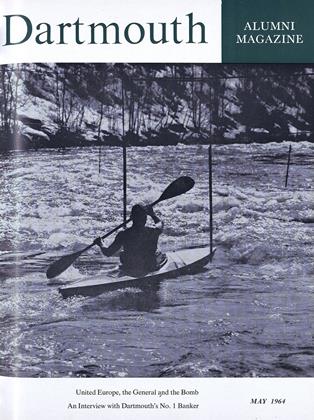lEISURE is the mother of discovery." This paraphrased maxim over the desk of Dr. Lawrence Kilham of the Dartmouth Medical School tells you much about the doctor's feelings toward research. It also may indicate why he was one of two Medical School professors recently chosen to receive Research Career Awards. (See Faculty Notes this issue.) The award will support him for the remainder of his research career and presumably give him the time and freedom to go forward with his research without extraneous worries.
Dr. Kilham is a research virologist by profession, a bird watcher by avocation, a literate historian of biology by early training, and a historian of medicine by recent inclination. History, of course, shows that leisure and curiosity are two of the essential ingredients in scientific discovery or any other intellectual growth. It's the historian Kilham who cites Sir Percival Potts, busy 18th century British physician, as an example. Sir Percival suffered a broken ankle and while thus involuntarily immobilized developed and published articles on the incidence of cancer among British chimneysweeps. This may not be news in the smog-plagued 20th century, but in 1775 it was a great landmark in cancer research. Would he have eventually put these observations on paper without the broken ankle? He had been a very busy medical practitioner before. No one will ever know, but the point is he did begin this new career after his imposed leisure. But leisure is a comparative thing. In talking to Dr. Kilham and doing some research on the researcher you begin to wonder if he would define leisure as "navel contemplating" as many do.
First of all he is engaged in research on latent viruses and their relationship to cancer and Mongolism under a seven-year grant from the National Institutes of Health. The work has developed many promising leads on how certain types of cancer develop. Previously, while working at Harvard Medical School and the National Institutes of Health in Bethesda, Md., he had isolated two kinds of latent viruses, one named rat virus and the other K (for Kilham) virus. The laboratory and microbiology classroom are enough to consume the energies of most men.
Secondly there is the medical-historian Kilham. During his undergraduate days at Harvard (A.B. '32 in history and literature) Samuel Eliot Morison suggested that his interest in biology and history could be combined. He took a master's, degree in biology at Harvard in 1935, but this led him on into medicine and he was granted the M.D. degree at Harvard in 1940. Service in the Army Medical Corps and research at Harvard and Bethesda followed, but, like the latent viruses he discovered in rats, the history-of-medicine: virus can also become virulent. Dr. Kilham now gives occasional lectures to. medical and pre-medical students on-the history of medicine, especially on, the physician-naturalists, and is contemplating various articles as a result of his, research for the talks.
Third, there is bird-watcher Kilham. He spends at least an hour a day with field glasses observing the action in a, woodlot near his Lyme, N. H., home. He has gotten to know the birds there as individuals, especially the woodpeckers. If he doesn't "speak" their language in an absolutely literal sense, at least he understands their communications. From their drumming and cries, he knows whether they are seeking a mate, locating a nest or objecting to the invasion of their territory. And if the weather or inclination keeps him indoors he can watch them in the limited-flight aviary he has built in his house. He has managed to get some wild woodpeckers to reproduce in this captivity, an extremely rare ornithological event.
His admiration for the birds stems from their obvious complete harmony with their environment. "Twentieth century man hasn't been able to adapt to his environment, to the balance of nature, and this is a cause of many of his tensions and anxieties," Dr. Kilham says.
And when he says this, things begin to fall into place. A man who has found this balance of interests - professional, avocational and otherwise — is in harmony with his environment and thus creates for himself all of the tension-free leisure that leads to discovery.
Under the watchful eye of his pet owl,Dr. Lawrence Kilham carries on his Medical School work as research virologist.
 View Full Issue
View Full Issue
More From This Issue
-
 Feature
FeatureUNITED EUROPE, THE GENERAL AND THE BOMB
May 1964 By HENRY W. EHRMANN, -
 Feature
FeatureDARTMOUTH'S NO. 1 BANKER
May 1964 By DERO A. SAUNDERS '35, -
 Feature
FeatureA New Strategy of Liberal Learning
May 1964 -
 Article
ArticleTHE UNDERGRADUATE CHAIR
May 1964 By DAVE BOLDT '63 -
 Class Notes
Class Notes1936
May 1964 By BARRY C. SULLIVAN, GILBERT BALKAM -
 Class Notes
Class Notes1922
May 1964 By LEONARD E. MORRISSEY, CARTER H. HOYT











